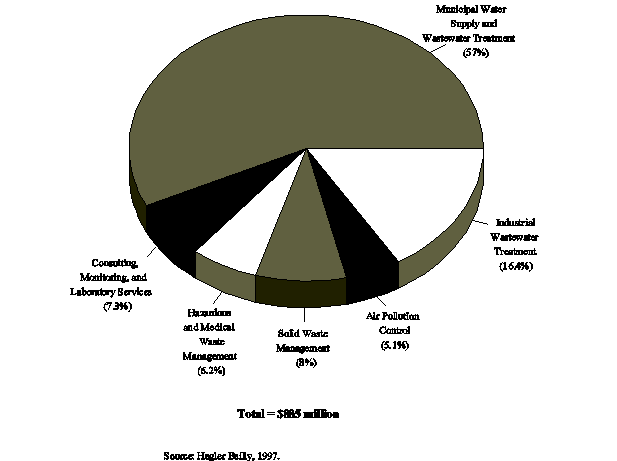Environmental Technologies Industries
 |
Environmental Technologies Industries
 |
| Argentina Environmental Export Market Plan |
Executive Summary
|
 |
 |
 |
During the 1990s, a number of environmental initiatives began in Argentina, making it a promising market for U.S. environmental technology and service exports. Among these initiatives is a major effort to strengthen Argentina's environmental legal framework, which is being supported by a number of multilateral development banks. Sectoral environmental laws and updated environmental standards are expected to be enacted over the course of the next two years. This effort also seeks to address the serious jurisdictional problems that have plagued the enforcement of environmental regulations currently in place. Decentralization efforts have led to a very uneven application of environmental laws across Argentina and even confusion about the requirements that apply from one project to the next, depending on location.
Argentina's Environmental Market Estimate (1998)

Argentina's overall market for environmental technologies and services is estimated to be $885 million for 1998. This is relatively small considering the country's size and gross domestic product; however, once a more effective regulatory structure is put into place, the market is expected to grow significantly. Three major trends are driving the current market: the privatization of water and wastewater systems, major river basin cleanup programs, and voluntary initiatives by private industry.
Even though Argentina is Latin America's most prosperous nation, it has the lowest percentage of households receiving potable water and sanitation services. In the early 1990s, a privatization program was launched for the country's water supply and wastewater systems to promote private investment in this sector. One of the earliest and best known systems to be privatized was the one in the Federal District of Buenos Aires. Aguas Argentinas, a multinational consortium led by the French water company Lyonnaise des Eaux, was awarded a 30-year concession for the supply of potable water and the collection and treatment of wastewater in the greater Buenos Aires area. Since 1993, the company has invested more than $700 million, increased coverage for both water supply and wastewater, and lowered water rates. Several provinces have subsequently awarded concessions to other consortiums with varying degrees of success, and still others are preparing bidding documents.
Because of their experience with the concession model, European companies--particularly the French--have enjoyed a competitive advantage in the water sector. Some U.S. companies have teamed with European firms to provide specific expertise, but as a whole, U.S. companies have not been very active in the municipal water sector.
With backing from the Inter-American Development Bank, Argentina has launched several major river basin cleanup programs. The priority areas are the Matanza-Riachuelo and Reconquista River basins, which encompass the greater Buenos Aires area. These programs focus on reducing the discharge of municipal and industrial wastewater, closing down illegal solid and hazardous waste dumps, and establishing environmental monitoring programs. Large public and private investments will be needed over the next five years to meet the programs’ objectives. Led by the larger companies, the private sector in Argentina is embracing voluntary measures as a means to establish good environmental management practices. Many of the larger companies are working to become ISO 14001 certified, and there are initiatives under way to tie regulatory compliance audits to annual certification reviews. There are also some pilot projects under way to promote cleaner production.
With the economy stabilized and on-track for expanded growth, Argentina is an attractive market for foreign investors and exporters of environmental technology. Doing business in Argentina is becoming easier. Having a local presence, preferably through a local office or partner, will be advantageous for participating in infrastructure development projects and for providing environmental technologies and services to both the government and private sector. For technology vendors, finding a well-established local partner or representative is well advised. U.S. products are highly regarded, but do face stiff competition from European suppliers. Projects supported by multilateral development banks present some of the best opportunities for international companies, but local resources are also being invested in the environmental market.
Contact
Us
About ITA
ITA Site Map
Privacy Statement
U.S.Department
of Commerce International
Trade Administration